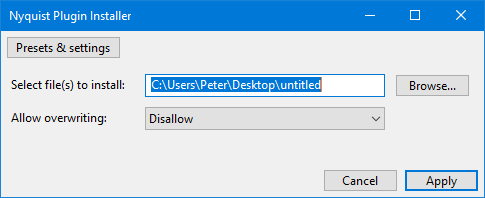Nyquist Plugin Installer
All Nyquist plugins are plain text files that have the file name extension '.NY'. This plugin installer provides a file browser for selecting the plugin '.NY' file, and then copies the file to the correct location. Once the plugin has been installed, it may be enabled in the Plugin Manager.
| Any new Nyquist plugins that you add to the Nyquist plugins folder will be automatically enabled, ready for use, the next time you launch Audacity. |
Note carefully that when you run Nyquist Prompt with a selected time-stretched clip active the changed speed of the clip will be automatically rendered.
|
- Accessed by:

- After installation, plugins must be enabled in the Plugin Manager.
Contents
To install a Nyquist plugin:
- Click the 'File Browser' button and select the plugin file.
- Click the 'Apply' button to install.
- Carefully review the output message.
- Close and relaunch Audacity to automatically enable the new effects so they are available in the Audacity menu.
Allow overwriting
This is off by default, preventing you from accidentally overwriting an existing Nyquist plugin of the same name.
If you do wish to overwrite an existing Nyquist plugin, change that to "Allow".
Tips:
Windows / Linux: If you are unable to locate a plugin that you have downloaded, this may be due to your web browser adding '.TXT' to the file name. In this case, you can change the file type filter in the file browser to show text files, or to show all files. The Nyquist Plugin Installer is able to automatically correct the file name if '.TXT' has been erroneously added.
macOS: When downloading a Nyquist plugin from the Internet, the web browser may add '.TXT' to the file name. Nyquist Plugin Installer can correct this error automatically. If the file name extension is anything other than '.NY' or '.NY.TXT', then it is not a valid Nyquist plugin and installation will fail.
.ZIP files: If the plugin file name ends with '.ZIP', then it is an archive file. The plugin file(s) inside the '.ZIP' files must be extracted first before they can be installed.
On successful installation: The Nyquist Plugin Installer will display the name of the installed plugin, and the full location of where it has been installed. Note that the installed plugin will not be available in the Audacity menus until it has been enabled in the 'Plugin Manager'.
Error messages:
- <file name> not found or cannot be read.
- The plugin file selected does not exist, or is not readable. Check that you have selected the correct file.
- <file name> is not a supported plugin.
- The selected file is not a Nyquist plugin, or is malformed. (It may be a valid plugin, but is not fully compliant with Nyquist plugin standards.)
- <file name> is not a valid Nyquist plugin.
- Nyquist plugins must have the file name extension '.NY'. This error occurs if the file does not have the correct file extension and the Nyquist Plugin Installer is unable to correct it.
- <file name> cannot be written.
- The plugin cannot be written to the default installation location. Ensure that you are logged in with a full user account (not a 'guest' account).
- <file name> is already installed.
- To avoid accidentally overwriting other plugins, if a plugin with the same file name exists, the Nyquist Plugin Installer will not overwrite it.
- If you are sure that the conflicting plugin is a totally different plugin that happens to have the same file name, then you could try renaming the new plugin. In this case you must ensure that the new name retains the '.NY' file name extension.
- Manual installation is still supported. See the instructions for your operating system.
Advanced Usage
- TXT / HTML files may be used by plugins to display a user manual for the plugin.
- LSP files may be used by a plugin to provide additional code that is, or can be used by multiple plugins.
To install other supported file types (TXT, HTML, LSP), select the appropriate file type filter in the file browser.
Note that the only file type for a Nyquist plugin is .NY. The other supported file types are copied to the user's plugin folder so that the associated plugin can access them, but do not need to be enabled in the Plugin Manager, and do not appear in the Plugin Manager.
Plugin Developer Note:
|